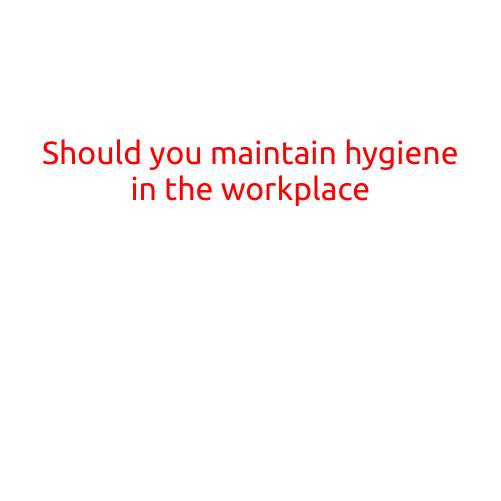
Should You Practice Hygiene at the Gym?
As more and more people hit the gym to stay fit and healthy, the importance of personal hygiene has become a growing concern. With the increasing risk of germ transmission and the potential for illness, it’s crucial to ask the question: should you practice hygiene at the gym?
The Risks of Poor Hygiene
Gyms can be breeding grounds for bacteria and other microorganisms, which can lead to a range of illnesses from colds and flu to more serious infections like MRSA (methicillin-resistant Staphylococcus aureus). Shared equipment, sweaty towels, and overcrowded spaces provide the perfect environment for germs to spread.
In fact, a study by the University of California, Los Angeles (UCLA) found that a single piece of gym equipment can harbor thousands of bacteria, including E. coli, Salmonella, and Staphylococcus aureus. Another study by the International Journal of Sports Medicine found that gym-goers who did not wash their hands regularly were more likely to contract an illness than those who did.
The Benefits of Good Hygiene
Practicing good hygiene at the gym can significantly reduce the risk of illness and infection. Here are a few simple habits to adopt:
- Wash your hands regularly: Use soap and water to wash your hands before and after using equipment, and after handling sweaty towels or used water bottles.
- Use a towel: Bring your own towel to wipe down equipment after use, and wash it regularly.
- Clean your equipment: Use disinfectant wipes or sprays to clean your equipment, especially after use.
- Avoid sharing towels or equipment: Keep your towels and personal items to yourself to avoid sharing germs with others.
- Wear clean clothes: Regularly wash your workout clothes and socks to prevent the spread of bacteria.
Additional Tips for Gym-goers
In addition to good hygiene practices, here are a few more tips to help reduce your risk of illness at the gym:
- Don’t touch your face: Avoid touching your face, especially your eyes, nose, and mouth, which are common entry points for germs.
- Avoid eating at the gym: Try to avoid eating at the gym to prevent crumbs and spills from attracting pests.
- Keep your personal space clean: Clean up after yourself, including wiping down your water bottle and tossing any trash.
- Take regular showers: Take a shower within 30 minutes of your workout to rinse off sweat and bacteria.
- Get a flu shot: Consider getting a flu shot to protect yourself against seasonal viruses.
Conclusion
In a crowded and busy gym environment, it’s crucial to prioritize hygiene to prevent the spread of illness and infection. By incorporating good hygiene practices into your gym routine, you can help protect yourself and others. Remember to wash your hands regularly, use a towel, clean your equipment, and avoid sharing towels or equipment. With a little extra effort, you can stay healthy, happy, and fit at the gym.





